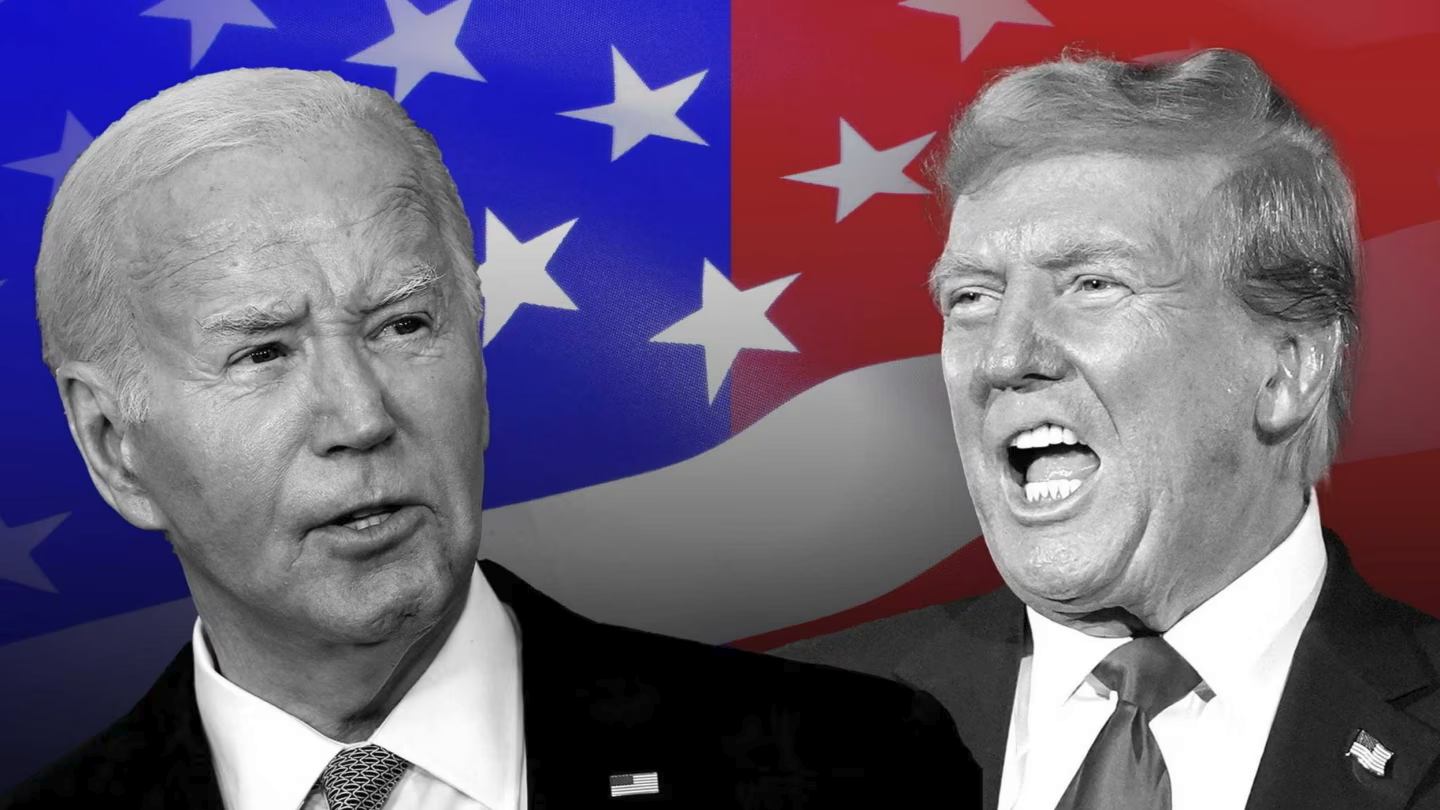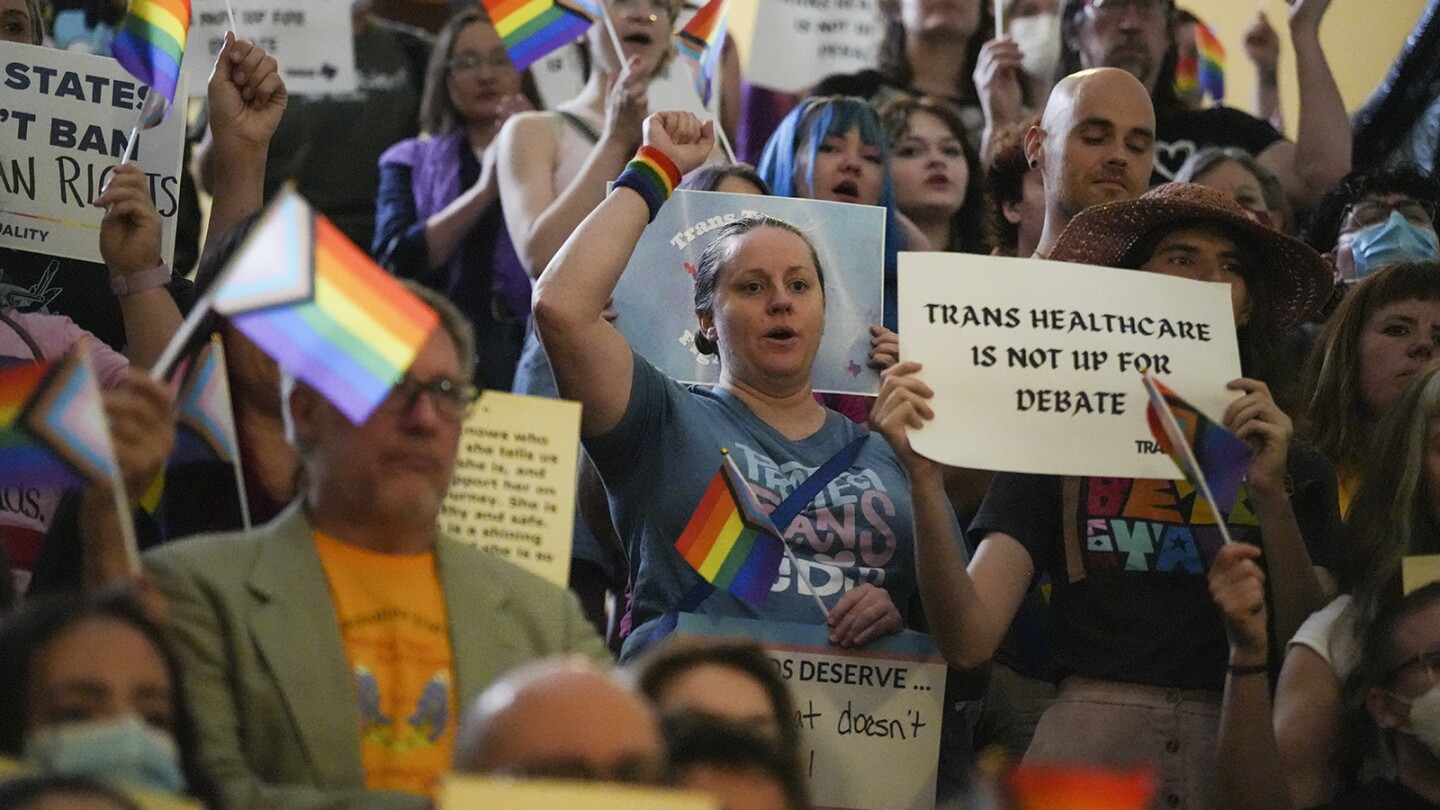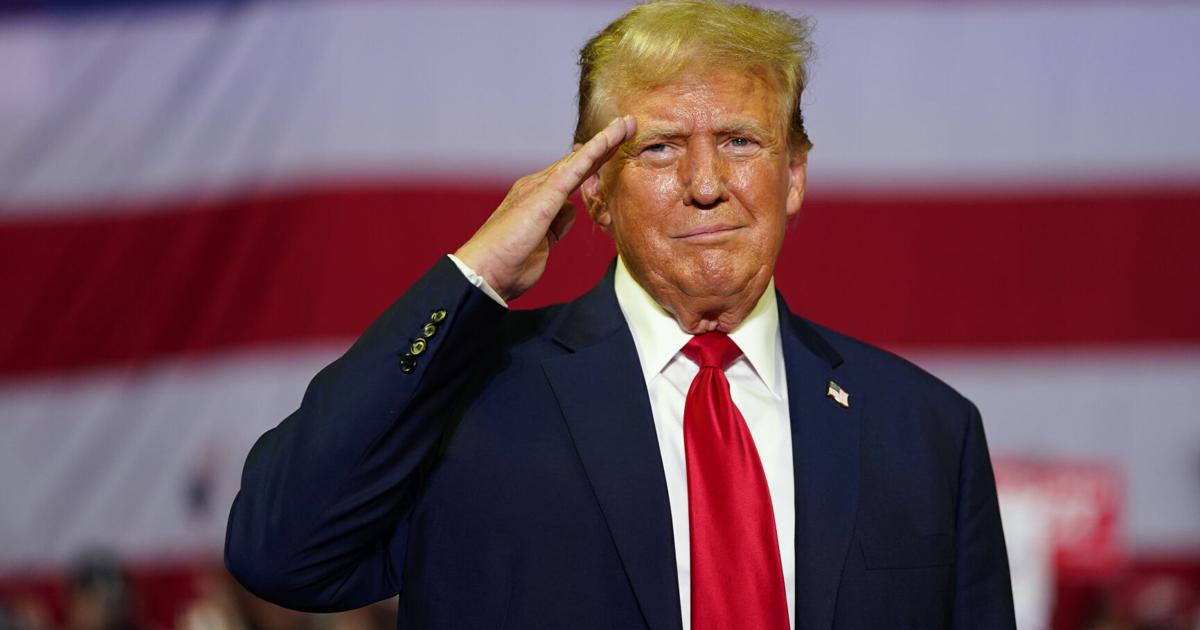Politics
Stream for the Presidential Debate Today: How To Watch the Debate and What To Expect
Published
1 week agoon

Former President Donald Trump and current President Joe Biden will have the debate of a lifetime today. With Joe Biden as President, many American’s have seen record-high inflation, interest rates, and a job-market that is incredibly gruesome depsite traditional media saying it’s doing fine.
Hosted by CNN, the debate will last 90 minutes and introduce some new rules to the format. CNN has changed the format entirely for unknown reasons, most likely due to Joe Biden’s mental health.
Here is what to know beforehand and how you can watch the upcoming presidential debate:
What time is the Presidential debate?
Thursday, June 27, at 9 p.m. ET – The debate will stream on CNN.com. USA TODAY will also stream it via YouTube, and ABC on Hulu.
YouTube link for the June 27, 2024 Debate via USA Today.
Who will moderate June’s presidential debate with Biden and Trump?
The debate will be moderated by CNN anchors Jake Tapper and Dana Bash, according to a statement from CNN’s press room.
According to the network, the new rules for the 90-minute debate will include no studio audience, no interaction from campaign staff, no use of notes and no interrupting.
Microphones will also be muted except for that candidate’s allotted time to speak. The moderators “will use all tools at their disposal to enforce timing and ensure a civilized discussion,” according to the network.
Both campaigns have agreed to the new rules.
Along with Biden and Trump, most notable candidates that may make ballots are Robert F. Kennedy Jr., running as an Independent, and Chase Oliver, running under the Libertarian Party.
Kennedy and Oliver will not be participating in the debate.

Latest
A San Francisco store is shipping LGBTQ+ books to states where they are banned
Published
6 days agoon
June 29, 2024
SAN FRANCISCO (AP) — In an increasingly divisive political sphere, Becka Robbins focuses on what she knows best — books.
Operating out of a tiny room in Fabulosa Books in San Francisco’s Castro District, one of the oldest gay neighborhoods in the United States, Robbins uses donations from customers to ship boxes of books across the country to groups that want them.
In an effort she calls “Books Not Bans,” she sends titles about queer history, sexuality, romance and more — many of which are increasingly hard to come by in the face of a rapidly growing movement by conservative advocacy groups and lawmakers to ban them from public schools and libraries.
“The book bans are awful, the attempt at erasure,” Robbins said. She asked herself how she could get these books into the hands of the people who need them the most.
Beginning last May, she started raising money and looking for recipients. Her books have gone to places like a pride center in west Texas and an LGBTQ-friendly high school in Alabama.
Customers are especially enthusiastic about helping Robbins send books to places in states like Florida, Texas and Oklahoma, often writing notes of support to include in the packages. Over 40% of all book bans from July 2022 to June 2023 were in Florida, more than any other state. Behind Florida are Texas and Missouri, according to a report by PEN America, a nonprofit literature advocacy group.
Book bans and attempted bans have been hitting record highs, according to the American Library Association. And the efforts now extend as much to public libraries as school libraries. Because the totals are based on media accounts and reports submitted by librarians, the association regards its numbers as snapshots, with many bans left unrecorded.
PEN America’s report said 30% of the bans include characters of color or discuss race and racism, and 30% have LGBTQ+ characters or themes.
The most sweeping challenges often originate with conservative organizations, such as Moms for Liberty, which has organized banning efforts nationwide and called for more parental control over books available to children.
Moms for Liberty is not anti-LGBTQ+, co-founder Tiffany Justice has told The Associated Press. But about 38% of book challenges that “directly originated” from the group have LGBTQ+ themes, according to the library association’s Office for Intellectual Freedom. Justice said Moms for Liberty challenges books that are sexually explicit, not because they cover LGBTQ+ topics.
Among those topping banned lists have been Maia Kobabe’s “Gender Queer,” George Johnson’s “All Boys Aren’t Blue” and Nobel laureate Toni Morrison’s “The Bluest Eye.”
Robbins said it’s more important than ever to makes these kinds of books available to everyone.
“Fiction teaches us how to dream,” Robbins said. “It teaches us how to connect with people who are not like ourselves, it teaches us how to listen and emphasize.”
She’s sent 740 books so far, with each box worth $300 to $400, depending on the titles.
At the new Rose Dynasty Center in Lakeland, Florida, the books donated by Fabulosa are already on the shelves, said Jason DeShazo, a drag queen known as Momma Ashley Rose who runs the LGBTQ+ community center.
DeShazo is a family-friendly drag performer and has long hosted drag story times to promote literacy. He uses puppets to address themes of being kind, dealing with bullies and giving back to the community.
DeShazo hopes to provide a safe space for events, support groups and health clinics, and to build a library of banned books.
“I don’t think a person of color should have to search so hard for an amazing book about history of what our Black community has gone through,” DeShazo said. “Or for someone who is queer to find a book that represents them.”
Robbins’ favorite books to send are youth adult queer romances, a rapidly growing genre as conversations about LGBTQ+ issues have become much more mainstream than a decade ago.
“The characters are just like regular kids — regular people who are also queer, but they also get to fall in love and be happy,” Robbins said.
_____
Ding reported from Los Angeles.
Austin Local News
Texas Supreme Court upholds ban on gender-affirming care for transgender minors
Published
7 days agoon
June 28, 2024
AUSTIN, Texas (AP) — The Texas Supreme Court upheld the state’s ban on gender-affirming care for transgender youths Friday, rejecting pleas from parents that it violates their right to decide on and seek medical care for their children.
The 8-1 ruling from the all-Republican court leaves in place a law that has been in effect since Sept. 1, 2023. Texas is the largest of at least 25 states that have adopted laws restricting or banning gender-affirming medical care for transgender minors.
The Texas law prevents transgender people under 18 from accessing hormone therapies, puberty blockers and transition surgeries, though surgical procedures are rarely performed on children. Children who had already started the medications had to taper off their use.
“We conclude the Legislature made a permissible, rational policy choice to limit the types of available medical procedures for children, particularly in light of the relative nascency of both gender dysphoria and its various modes of treatment and the Legislature’s express constitutional authority to regulate the practice of medicine,” Justice Rebeca Aizpuru Huddle wrote in the court’s decision.
The lawsuit that challenged the Texas law argued it devastates transgender teens who are unable to obtain critical treatment recommended by their physicians and parents. The Williams Institute at the UCLA School of Law estimates about 29,800 people ages 13-17 in Texas identify as transgender.
The only justice dissenting with Friday’s ruling said the Texas Supreme Court was allowing the state to “legislate away fundamental parental rights.”
“The State’s categorical statutory prohibition prevents these parents, and many others, from developing individualized treatment plans for their children in consultation with their physicians, even the children for whom treatment could be lifesaving,” Justice Debra Lehrmann wrote in a dissenting opinion. “The law is not only cruel — it is unconstitutional.”
A lower court had ruled the law unconstitutional, but it was allowed to take effect while the state Supreme Court considered the case.
Texas’ Republican attorney general, Ken Paxton, vowed in a post on the social platform X after the ruling that his office “will use every tool at our disposal to ensure that doctors and medical institutions follow the law.”
Advocates criticized the ruling.
“It is impossible to overstate the devastating impact of this ruling on Texas transgender youth and the families that love and support them,” said Karen Loewy, senior counsel and director of Constitutional Law Practice at Lambda Legal, which was among the groups that sued the state on behalf of doctors and families.
“Our government shouldn’t deprive trans youth of the health care that they need to survive and thrive,” said Ash Hall, policy and advocacy strategist for LGBTQIA+ rights at ACLU of Texas. “Texas politicians’ obsession with attacking trans kids and their families is needlessly cruel.”
The law includes exemptions for children experiencing early puberty or who have “a medically verifiable genetic disorder of sex development.”
Such exemptions underscore the law’s discriminatory nature, said Dr. Jack Drescher, a psychiatry professor at Columbia University who edited the section about gender dysphoria in the American Psychiatric Association’s diagnostic manual. Gender dysphoria is the psychological distress experienced by those whose gender expression does not match their gender identity and is a required diagnosis before treatments can begin.
“They’re saying if you’re not a transgender child and you need these drugs, you can have them, but if you’re a transgender child who might benefit from these drugs, then sorry, you have to move to another state,” Drescher said.
The restrictions on health care are part of a larger backlash against transgender rights, touching on everything from bathroom access to participation in sports. Former President Donald Trump has vowed to pursue other measures that would restrict the rights of transgender people if he wins the November election, including a ban on gender-affirming care for minors at the federal level.
As more states move to enforce health care restrictions, families of transgender youths are increasingly forced to travel out of state for the care they need at clinics with growing waiting lists. At least 13 states have laws protecting care for transgender minors.
Most of the states that have passed restrictions face lawsuits, and the U.S. Supreme Court recently agreed to hear an appeal from the Biden administration attempting to block state bans on gender-affirming care. The case before the high court involves a Tennessee law that restricts puberty blockers and hormone therapy for transgender minors, similar to the Texas law.
Gender-affirming care for transgender youths is supported by major medical organizations, including the American Medical Association, the American Academy of Pediatrics, the American Psychiatric Association and the Endocrine Society.
In a concurring opinion, one justice dismissed the position of the medical groups.
“The fact that expert witnesses or influential interest groups like the American Psychiatric Association disagree with the Legislature’s judgment is entirely irrelevant to the constitutional question,” Justice James Blacklock wrote. “The Texas Constitution authorizes the Legislature to regulate ‘practitioners of medicine.’”
Texas officials defended the law as necessary to protect children and noted a myriad of other restrictions for minors on tattoos, alcohol, tobacco and certain over-the-counter drugs.
Several doctors who treat transgender children testified in a lower court hearing that patients risk deteriorating mental health, which could possibly lead to suicide, if they are denied safe and effective treatment.
The ban was signed by Republican Gov. Greg Abbott, the first governor to order the investigation of families of transgender minors who receive gender-affirming care.
___
DeMillo reported from Little Rock, Arkansas.
Latest
Judge alters Trump’s gag order, letting him talk about witnesses, jury after hush money conviction
Published
1 week agoon
June 25, 2024
NEW YORK (AP) — A Manhattan judge on Tuesday modified Donald Trump’s gag order, freeing the former president to comment publicly about witnesses and jurors in the hush money criminal trial that led to his felony conviction, but keeping others connected to the case off limits until he is sentenced July 11.
Judge Juan M. Merchan’s decision — just days before Trump’s debate Thursday with President Joe Biden — clears the presumptive Republican nominee to again go on the attack against his lawyer-turned-foe lawyer Michael Cohen, porn actor Stormy Daniels and other trial witnesses. Trump was convicted in New York on May 30 of falsifying records to cover up a potential sex scandal, making him the first ex-president convicted of a crime.
AP correspondent Julie Walker reports Donald Trump’s gag order in his hush money case is altered just ahead of the presidential debate.
In a five-page ruling, Merchan wrote that the gag order was meant to “protect the integrity of the judicial proceedings” and that protections for witnesses and jurors no longer applied now that the trial has ended and the jury has been discharged.
Merchan said it had been his “strong preference” to continue barring Trump from commenting about jurors, whose names have not been made public, but that he couldn’t justify doing so. The judge did leave in place a separate order prohibiting Trump and his lawyers from disclosing the identities of individual jurors or their addresses. Trump lawyer Todd Blanche said after the verdict the defense team has destroyed that information.
“There is ample evidence to justify continued concern for the jurors,” Merchan wrote.
Merchan also left in place a ban on Trump commenting about court staffers, the prosecution team and their families until he is sentenced, writing that they must “continue to perform their lawful duties free from threats, intimidation, harassment, and harm.” Those restrictions do not prohibit Trump from commenting about the judge himself or District Attorney Alvin Bragg, whose office prosecuted the case.
Trump’s lawyers had urged Merchan to lift the gag order completely, arguing there was nothing to warrant restricting Trump’s First Amendment rights after the trial’s conclusion. Trump has said the gag order prevented him from defending himself while Cohen and Daniels continued to pillory him.
Though largely a win for Trump, his campaign spokesperson Steven Cheung criticized Tuesday’s ruling as “another unlawful decision by a highly conflicted judge, which is blatantly un-American as it gags President Trump, the leading candidate in the 2024 Presidential Election during the upcoming Presidential Debate on Thursday.”
Cheung said Trump and his lawyers “will immediately challenge today’s unconstitutional order,” arguing that portions of the gag order still in effect prevent him from speaking about the judge, whom he alleges had a conflict of interest, or repeating his unfounded claims that Biden directed the prosecution.
The Manhattan DA’s office had asked Merchan to keep the gag order’s ban on comments about the jury and trial staff in place at least until Trump is sentenced, but said last week they would be OK allowing Trump to comment about witnesses now that the trial is over.
A message seeking comment was left with the Manhattan DA’s office.
Cohen, who testified for four days against his ex-boss, reacted to the ruling via text message. He wrote: “For the past 6 years, Donald and acolytes have been making constant negative statements about me. Donald’s failed strategy of discrediting me so that he can avoid accountability didn’t work then and won’t work now.”
Daniels’ lawyer Clark Brewster said they “have nothing but respect” for Merchan and defer to his post-verdict review of the gag order “in the context of free speech and any continuing danger to the judicial process.”
“His decision to impose restrictions on Mr. Trump, as it related to reckless and unrelenting character attacks on court personnel, trial witnesses, and potentially jurors was extraordinary but clearly justified given the defendant’s uncontrollable daily rants,” Brewster said.
Trump was convicted on 34 counts of falsifying business records arising from what prosecutors said was an attempt to cover up a hush money payment to Daniels just before the 2016 presidential election. She claims she had a sexual encounter with Trump a decade earlier, which he denies.
The crime is punishable by up to four years behind bars, but prosecutors haven’t said if they would seek incarceration and it’s unclear if Merchan would impose such a sentence. Other options include a fine or probation.
Following his conviction, Trump complained he was under a “nasty gag order,” while also testing its limits. In remarks a day after his conviction, Trump referred to Cohen as “a sleazebag,” though not by name.
In a subsequent Newsmax interview, Trump took issue with jury and its makeup, complaining about Manhattan, “It’s a very, very liberal democrat area so I knew we were in deep trouble,” and claiming: “I never saw a glimmer of a smile from the jury. No, this was a venue that was very unfair. A tiny fraction of the people are Republicans.”
Trump’s lawyers, who said they were under the impression the gag order would end with a verdict, wrote to Merchan on June 4 asking him to lift the order.
Prosecutors wanted Merchan to keep the gag order’s ban on comments about jurors and trial staff “at least through the sentencing hearing and the resolution of any post-trial motions.” They argued the judge had “an obligation to protect the integrity of these proceedings and the fair administration of justice.”
Merchan issued Trump’s gag order on March 26, a few weeks before the start of the trial, after prosecutors raised concerns about the presumptive Republican presidential nominee’s propensity to assail people involved in his cases.
Merchan later expanded it to prohibit comments about his own family after Trump made social media posts attacking the judge’s daughter, a Democratic political consultant.
During the trial, Merchan held Trump in contempt of court, fined him $10,000 for violating the gag order and threatened to put him in jail if he did it again.
In seeking to lift the order, Trump lawyers Todd Blanche and Emil Bove argued that Trump was entitled to “unrestrained campaign advocacy” in light of Biden’s public comments about the verdict, and Cohen and Daniels ′ continued public criticism.
__
Associated Press reporter Jill Colvin contributed to this report.







